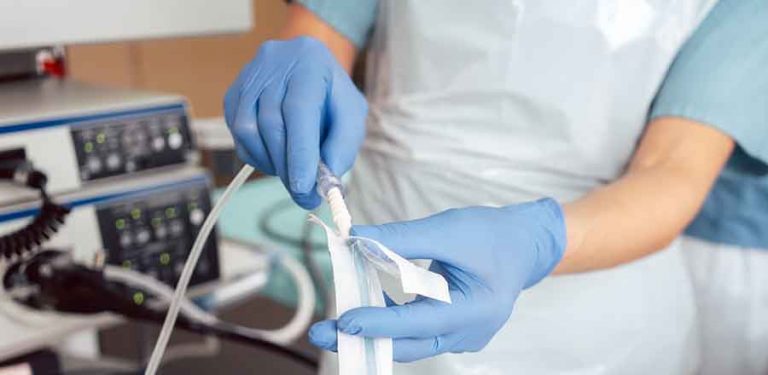Carly Bingham talks about gastrointestinal (GI) physiology
- Programme
- STP
- Role
- Alumni
Carly studied a Masters in engineering, followed by the MSc in Clinical Engineering at King’s College London before taking up the role of paediatric clinical scientist in gastrointestinal (GI) physiology at Evelina London Children’s Hospital.
How did you get your job as a clinical scientist?
After completing my initial degree, I joined the NHS Scientist Training Programme (STP), having been introduced to the scheme by an alumni mentor. I spent three years in clinical training, rotating across a variety of departments and doing a part-time Masters in clinical engineering, before qualifying and taking up my current role.
What does the role involve?
I’m responsible for investigating why children are having problems with their digestive system. I perform investigations of the oesophagus and bowel to measure how the muscles are moving compared to the muscles of a healthy individual. This involves inserting catheters with very sensitive sensors into the oesophagus and rectum to build data of the muscles in motion and then analysing this data to figure out where the problem might be. When I’m not on the ward with my equipment or analysing the data, I teach on the Clinical Science MSc at King’s College London, train placement students from across the country to perform paediatric investigations and do research. I’m also a STEM ambassador and volunteer with the national working group for paediatric GI motility investigations.
What do you enjoy most about your job?
The variety of my work – one day I can be in the office presenting results to my colleagues in a multidisciplinary meeting and planning a child’s ongoing care, and the next I’m on the ward performing multiple different procedures on children from babies to teenagers. Even when you think you know what’s going to happen on a particular day, young people always find a way to surprise you.
How has your role developed and what workplace issues are you most passionate about?
My role didn’t exist when I started, so it has developed significantly in the five years I’ve been here. There was just a single consultant performing one investigation every six months and a waiting list over a year long. The service has grown since then and we now see more than 250 patients a year, as well as adding the research, equipment management and teaching components to my role. I’m passionate about making sure clinical scientists are recognised as an essential part of the workforce – the pandemic has raised awareness of clinical staff beyond doctors and nurses, but there’s still limited understanding of the role of a clinical scientist and the wide range of jobs they perform across the healthcare sector.
This profile was supplied by the graduate careers organisation Prospects. Click this link to read the full profile on the Prospects website.
